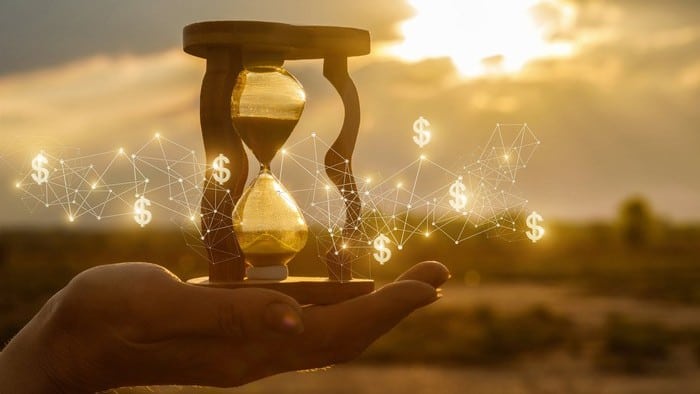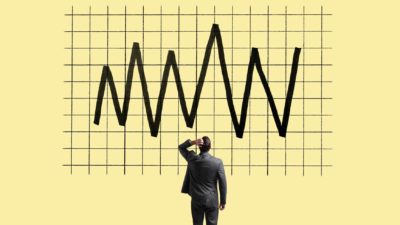I Googled 'wake me up' last night.
I didn't get the result I expected.
I was looking for the Wham! song. You know the one…
Wake me up before you go-go
Don't leave me hanging on like a yo-yo
Yeah, that one.
I was going to play it for my son.
(It sounded like he was humming part of it, so I thought I'd play him the whole song. He swears that wasn't what he was humming… #DadFail)
Anyway… when I put the search into Google, I instead got the song by Avicii.
Talk about a way to make a bloke feel old.
(If you don't know who Avicii is… or who Wham! is… congratulations, you've just dated yourself. I only know the former because my son likes the Avicii song of the same title, too!)
Speaking of old, though, a few coincidences have got me thinking about the passing of time.
I'm coming up on a work anniversary at The Motley Fool, and have started getting LinkedIn messages.
Yesterday was 31 years since Nelson Mandela was released from prison on Robben Island, having spent 27 years in custody.
It was also my late Pop's birthday.
Today is apparently the 25th anniversary of the release of Baz Lurhmann's Romeo & Juliet.
All days and weeks have their confluence of anniversaries, of course, and there's nothing uncommonly remarkable about this week… it was just something that I noticed.
Maybe it's because today is Lunar New Year. (Kung Hei Fat Choy!)
Maybe it's because I'm in that part of my life when it's likely that I have fewer days left, than I have lived, but it's hard to believe that Mandela was released from prison 31 years ago, or that R&J hit our screens in 1996.
It doesn't help to realise we're now closer to 2050 than 1980, either!
I'm pretty sure you're with me on the 'time flies' thing.
And that's important for us as investors too – in two very different ways.
The first is how quickly we as consumers (and businesses) adapt to the 'new normal'.
Since Romeo & Juliet, the internet has gone mainstream (and the movie would be a good chance to be a Netflix Original if it was released today, rather than enjoy its premiere on the big screen).
We can't really imagine life without computers or smartphones.
Electric vehicles, once the stuff of science fiction, made up the majority of new car sales in Norway last year.
The world's largest companies are no longer oil drillers, industrial conglomerates, cigarette makers or traditional car manufacturers.
They are smartphone companies, search businesses, software designers, e-commerce players and electric vehicle innovators.
I think that's worth keeping in mind as you think about the likely winners of the next 10, 20 or 30 years.
The second reason the 'time flies' thing is worth being aware of is that while thinking about investing for the long term can feel challenging, that perspective is helpful.
The developed world's stock markets (including the ASX) are generally considered to have increased at a compound annual return of around 10% per year over the long term.
And while that's a helluva lot more than you'll get on cash in the bank, it doesn't always feel exciting to have $100 turn into $110.
Or to have to wait 7 years to turn $100 into $200.
It's welcome, sure… but 7 years feels like such a long time to wait.
The catch, of course, is we would have felt like that in 1988 when Mandela was released from prison, or while watching Romeo & Juliet for the first time.
Sitting around a table in '88, we would have hated the idea of having to wait until 1995 to (hypothetically) double our money. Indeed, 2021 would have seemed almost unimaginable.
Of course, if we had earned that historical 10%, we would have doubled our money in 1995, again in 2002, then in 2009 and once again in 2016. We'd now be only 2 years away from yet another double.
(The actual market return has differed, of course, but the future is also unknowable, so just stick with me for the purposes of the example!)
If you're keeping track, in two years time, we'd have had our fifth double.
And if you have a passing acquaintance with compounding, you'll know that a 'fifth double' is not just '5 x 2'.
Indeed, if you invest $1,000 and it doubles 5 times, you first go to $2,000.
Then $4,000
Then $8,000
Then $16,000
And, at the end of the 35 year period, if you doubled your money every seven years, you'd have $32,000.
Now, imagine starting with $10,000 instead…
Or, if you'd rather work backwards, to have a million dollars, you'd only have needed to start with just over $31,000.
And that assumes you didn't add a single cent.
Save and invest regularly, and the numbers truly explode.
My point?
Well, other than the truly impressive nature of compounding, it's to take us back to 1988… or 1996… or pretty much any time in the past.
Given those numbers above, wouldn't you love to go back and have the means, the discipline and/or the knowledge to have started investing (or have invested more) back then?
I know I would.
But here's the kicker.
Don't you reckon that in 10, 20 or 30 years from now, you'll wish you could go back to 2021 and do the same?
Yeah, me too.
Maybe you genuinely don't have the option of investing (more).
Fair enough.
But I reckon 99% of the people reading this, if they're truly honest with themselves, would acknowledge they could put just a little more money away… starting right NOW.
So, what's stopping you?
Don't you owe it to your future self to put your shoulder to the wheel with just a little bit more effort?
I'm not sure I'll be still writing these articles in 31 years' time. I hope I am.
But either way, I hope you'll look back on today fondly, as the day you tilted your financial future a little further upward.









